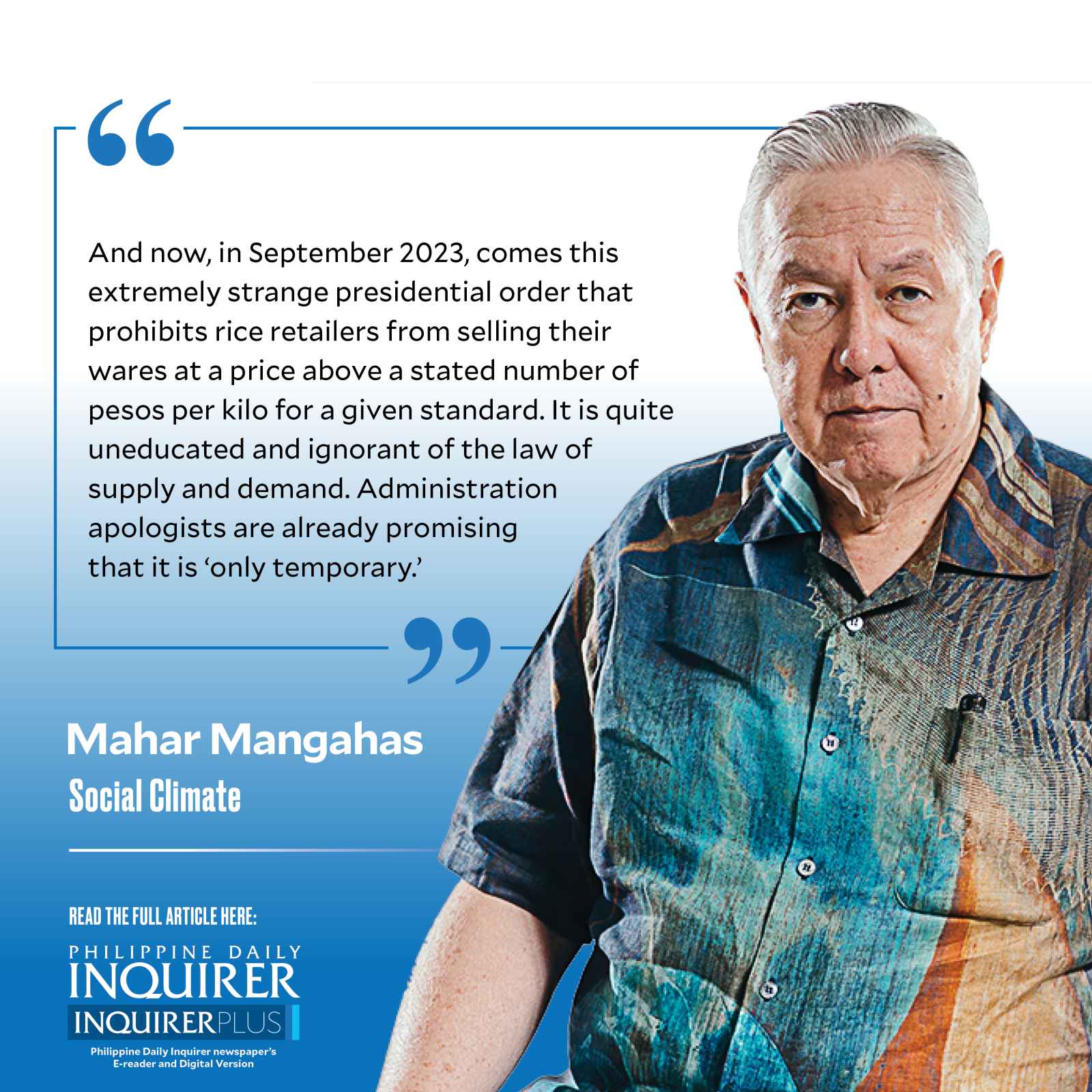Thoughts of an old rice economist

Becoming a rice economist, six decades ago, wasn’t my choice, but that of my employer, the University of the Philippines (UP), which was building up its economics faculty. I, a lowly economics instructor, was one of its prospects for graduate training abroad in its “missing fields,” one of them being agricultural economics.
I protested that all I knew about farming was how to water the plants in our family residence on the Diliman campus. (Which was no small job, my father being a garden fiend, and could take half a day.) No problem, said department chair José “Pepe” Encarnación Jr.; we’ll send you to Los Baños for a year, so you can learn it.
Thus I got seconded to the International Rice Research Institute (IRRI), to be research assistant of Vernon “Vern” Ruttan, its agricultural economist. IRRI, newly founded in 1960, was brand-new when I got there in 1964. Pepe and Vern were two of my first mentors. By 1965, I had done my master’s thesis for UP, “The response of Philippine rice farmers to price,” with Vern as my adviser.
It was part of the Chicago-led research trend to see whether poor farmers weren’t just as rational as rich farmers in the developed countries. (Our idol was University of Chicago professor Theodore W. Schultz, author of “Transforming Traditional Agriculture”.) The research answer was Yes: Filipino farmers do devote more area to rice in response to an expected higher price of the harvest; Filipinos are quite similar to Americans, Indians, and Indonesians on that score.
I was thrilled to be accepted at Chicago. T.W. Schultz became my third mentor; that was before he got his economics Nobel. I took agriculture (my UP assignment) and econometrics (my own choice) as special topics, to teach later on. My 1970 doctoral thesis under Schultz, “An economic analysis of the diffusion of new rice varieties in Central Luzon,” was based on survey data shared by the former Bureau of Agricultural Economics.
Meanwhile, back in Diliman for thesis work in 1968-1969, I published a piece, “The effect of importation on the price of rice,” which estimated that the dampening effect of rice imports was smaller than that of an equal amount of domestic rice production; I reasoned that the government’s policy of importing rice only in election times was too predictable, and the market adjusted accordingly.
I was quite busy as a consultant in 1970-1972: for secretary Rafael Salas, when he was Ferdinand Marcos’ “rice czar”; for the Rice and Corn Administration (forerunner of the National Food Authority); in Indonesia for a study of rice intensifikasi, by a team headed by Orlando J. Sacay; and at the Ateneo de Manila’s Institute of Philippine Culture, to help in a survey of Nueva Ecija farmers affected by “Operation Land Transfer.” I taught agricultural economics and econometrics at the UP School of Economics until my full-time transfer to the Development Academy of the Philippines in 1981.
In 1995, there would not have been a rice crisis in the lean month of August, if the government—which had the sole power to do so—had arranged for rice imports early in the year. But the administration, under Fidel Ramos then, thought that nonimportation would instill national pride and be good publicity before the May election.
These are thoughts of an old, indeed very old, rice economist, who knows whereof he speaks, and who welcomed Republic Act No. 11203 (2019), “Liberalizing the Importation, Exportation and Trading of Rice, Lifting for the Purpose the Quantitative Import Restriction on Rice, and For Other Purposes.” (The shortened form, “rice tariffication law,” does not do it justice—best of all to have a zero tariff!) At last, for the first time in the entire history of the republic, the private sector may import rice, in any quantity it wants.
Only since 2019 has the Philippine government allowed private participation in the international trade of rice. I readily joined my colleagues in the Foundation for Economic Freedom in cheering this move. Freedom of trade is good for producers and consumers alike.And now, in September 2023, comes this extremely strange presidential order that prohibits rice retailers from selling their wares at a price above a stated number of pesos per kilo for a given standard. It is quite uneducated and ignorant of the law of supply and demand. Administration apologists are already promising that it is “only temporary.”
Everyone affected will be figuring out how to comply with it formally, and how to avoid it in reality. The true quality of rice sold will suffer. Sellers may stop selling rice openly; they may even stop selling rice altogether, and leave it as work for the government to do. Buyers will cooperate in transacting business secretly.
Whatever may be the purpose of this order, ultimately it will not do good economics. Is it supposed to do good politics? How, and for whom?
—————-
Contact: mahar.mangahas@sws.org.ph.




















